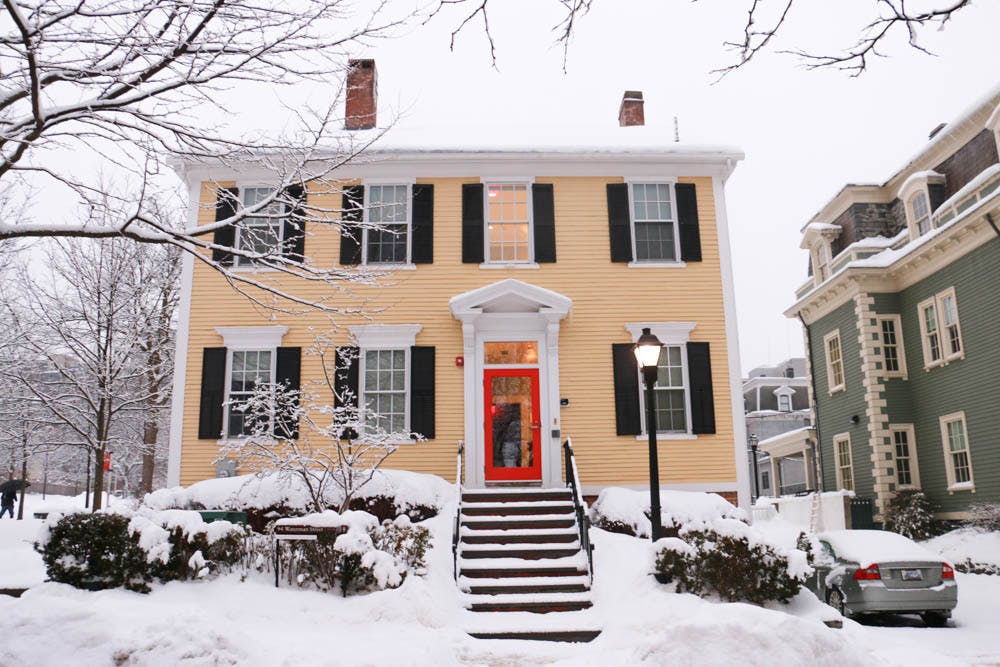Maiyah Gamble-Rivers MA’16, the Center for the Study of Slavery and Justice’s manager of programs and outreach, grew up hearing her grandparents talk about life in South Carolina under Jim Crow. “The civil rights movement reminds me of my history,” she said. “It makes me better understand my family.”
But as a student at Hope High School, there was “an overwhelming (amount) of information that I was never taught,” she said. Her personal connection to the movement coupled with her dissatisfaction with the high school curriculum’s treatment of civil rights compelled her to ensure that current Hope High School students “see themselves in the narrative of struggle.”
In 2016 Gamble-Rivers created the Civil Rights Movement Initiative, a program that teaches high school students about the civil rights movement through an annual series of workshops that run from October to January. The initiative culminates in a free week-long trip through the South in which the students visit cities central to the civil rights movement.
Gamble-Rivers said that young people are commonly misperceived as lacking interest in civil rights. But last year, Providence high schoolers demanded that ethnic studies be included in public education, demonstrating their desire to learn more about their backgrounds.
The CSSJ, which funds the initiative, wanted to reach out to Hope High School and the broader Providence community because it “constantly (tries) to make scholarship from the University accessible to the public,” she said.
“Maiyah came to my (Advanced Placement) English class and did a presentation about the program,” said Imani, a high school junior and 2016-17 program fellow whose last name has been omitted for privacy reasons. Interested students were asked to write an application essay about their favorite activist — with the constraint that they couldn’t choose Martin Luther King Jr. or Rosa Parks.
The program hosts four fellows this year and had five fellows its inaugural year. Gamble-Rivers led the workshops on a weekly basis, and the sessions covered topics from the legacy of slavery to the role of music in the civil rights movement. Students discussed parallels between the movement and Black Lives Matter and also talked about current political issues like mass incarceration, Gamble-Rivers said.
Hafzat Akanni, a program alum from last year, said that the workshops encouraged discussion, which made processing difficult subjects much easier. In their first workshop, students read about the murder of Emmett Till. “I had a lot of questions and opinions, but the fact that I could talk about it with everyone else was really relieving,” Akanni said.
Gamble-Rivers assigned regular readings prior to each workshop — a workload comparable to other high school classes the students were taking, Akanni said. Everyone “wanted to do the research … we were all so passionate about the work,” she added.
After finishing the workshop series, the students then travel through the South to visit cities like Birmingham, Selma and Little Rock. This year the trip took place from Jan. 13 to Jan. 20.
In addition to visiting museums and landmarks within those cities, students had the opportunity to speak with activists who participated in the movement. “(Meeting) with the activists made me realize that … they were beaten and tortured so we could have … integrated stores and schools,” Imani said. “A lot of them were my age (at the time) and if they weren’t so brave, we wouldn’t have what we have now.”
In Sunflower County, Mississippi, students visited the Sunflower County Freedom Project, a nonprofit working to improve the educational resources available to students living in the county. The CRMI students were particularly struck by the disparity in secondary education offered to students in Sunflower County and Providence. “(The students) would travel an hour and back just to receive SAT prep,” Akanni said. The experience “taught us how much privilege we had,” she added.
The visit also encouraged the students to create a partnership between Hope High School and the project by having Hope High students collect books to send to Sunflower County, Gamble-Rivers said. Brown community members may donate books by dropping them off at the CSSJ, she added.
The trip has even come to shape some students’ lives beyond high school.
“I was able to take what I learned and apply it to (every aspect of) my life,” Akanni said. Now a first-year at Boston University, she is majoring in journalism with a double minor in international relations and African-American studies — a decision she said was influenced by her experience with the initiative.
Jessie Dough, who participated in the program last year, said it encouraged her to inform her friends about the importance of voting. “I was encouraging people to vote (in the 2016 election) because I had learned about how many people died trying (to secure) the right to vote,” she said.
Dough also stressed that the program made her realize that some of the most influential leaders of the movement aren’t always well-known. Understanding that there were many “civilians who helped but weren’t necessarily leaders or prominent people of the time was important … (it showed me how) people individually helped in their community.”
Participants in the second annual CRMI will present their work at a lunch talk held at Churchill House at noon today.
Correction: A previous version of this article misspelled the name of Hafzat Akanni. Her name is spelled "Hafzat Akanni," not "Hefatz Akkani." The Herald regrets the error.





